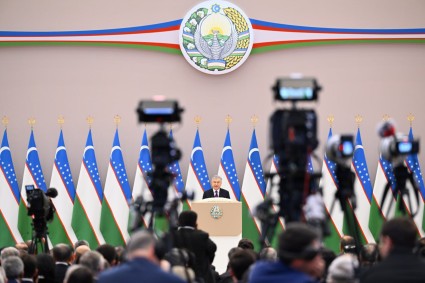To help boost local governance, ownership, and cooperation over shared water resources between upstream and downstream countries in Central Asia, today the United Statesfacilitated a second joint meeting of the Uzbek and Kygyz Padshaota River Small Basin Councils in Namangan, Uzbekistan. The meeting was organized with assistance from the United States Agency for International Development’s (USAID) Smart Waters project, implemented by the Regional Environmental Center for Central Asia (CAREC), to enhance regional cooperation over shared water resources.
In Central Asia there are more than 200 small transboundary rivers that face a number of issues, including infrastructure deterioration and outdated technologies that lead to inefficient water resources use. The Padshaota, a small transboundary river located in the Ferghana Valley and shared between Kyrgyz Republic and Uzbekistan, is one of the eight pilot sites where Smart Waters is promoting better shared water resources management. Cooperative management of shared water resources is crucial to ensuring fair and equitable distribution and avoiding disputes and tensions across borders.
At the event USAID Country Director for Uzbekistan, Gary Robbins,noted that: “Effective transboundary water resource management and cooperation are closely related to socioeconomic development and stability in Central Asia. Today’s meeting is a positive step forward in the joint management of shared water resources between Kyrgyzstan and Uzbekistan. It is particularly fitting that we are all gathered here today as the world celebrates Earth Day, which reminds us that we are all stewards of our planet’s most precious resource—water.”
The meeting brought together representatives of governmental and nongovernmental organizations to discuss cooperation on water management, including measures to protect river banks, prevent mudflow and improve water distribution systems on both the Kyrgyz and Uzbek sides of the river.
Smart Waters works with local communities to create small basin councils (SBC) that bring together representatives from civil society, local government agencies, organizations that address health and emergencies, as well as well as farmers and other water users to encourage an inclusive and participatory approach to water management that encourages constructive dialogue and common solutions for joint actions.










